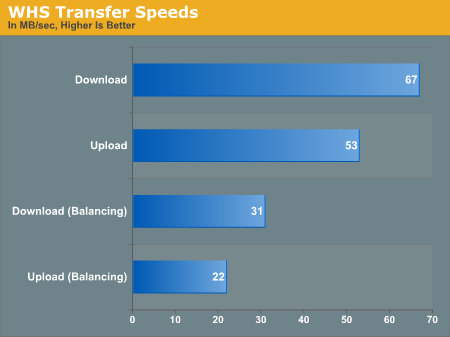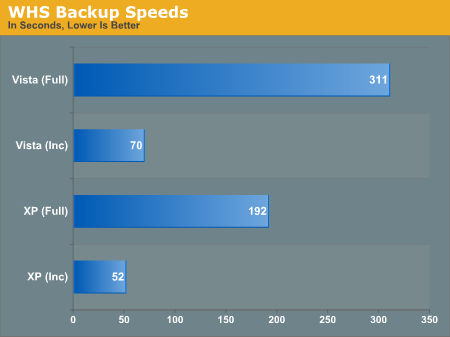A New Kind of Home Computer: Windows Home Server Preview
by Ryan Smith on September 4, 2007 1:00 PM EST- Posted in
- Systems
Performance Data
Because we were only able to get our hands on a release candidate version of WHS for the performance testing, all the results here need to be taken with a grain of salt. The WHS RC is quite good, especially in comparison to rockier launches like Vista, but we expect the performance numbers in particular to have changed slightly between the RC and the final version.
It's worth noting that the network packet throttling problem with Vista is still in play as of this writing. As a result all of our tests are under Windows XP SP2 unless otherwise noted, and when they're run on Vista it is with Multimedia Class Scheduler Service disabled to prevent throttling. Although this problem has existed in Vista since it has shipped, this is about the worst time it could come to light for Microsoft. Until it's fixed, Vista users wanting to move their media off of a personal computer and onto a WHS server will definitely want to hold off on doing so. Even though the problem with throttling isn't one with WHS, the problem occurring in Vista still drags down WHS.
| Client Test Bed | |
| Processor | Intel Core 2 Quad QX6850 (3.00GHz/1333MHz) |
| RAM | G.Skill DDR2-800 (2x2GB) |
| Motherboard | Gigabyte GA-P35-DR3R (Intel P35) |
| System Platform Drivers | Intel 8.1.1.1012 |
| Hard Drive | Maxtor MaXLine Pro 500GB SATA |
| Video Cards | 1 x GeForce 8800GTX |
| Video Drivers | NV ForceWare 163.44 |
| Power Supply | OCZ GameXStream 700W |
| Desktop Resolution | 1600x1200 |
| Operating Systems | Windows Vista Ultimate 32-Bit Windows XP SP2 |
| . | |
| Server Test Bed | |
| Processor | AMD Athlon X2 4600+ (2.40GHz/400MHz) |
| RAM | OCZ DDR-400 (4x512MB) |
| Motherboard | ASUS A8N-SLI Premium (nForce 4 SLI) |
| System Platform Drivers | NV 6.69 |
| Hard Drive | 2x Western Digital Caviar Raid Edition 2(400GB) |
| Power Supply | OCZ GameXStream 700W |
| Operating Systems | Windows Home Server RC |
| . | |
We'll start with testing WHS's file server abilities by transferring files back and forth. With a gigabit network, the bottleneck will be the transfer abilities of our hard drives, so if WHS is achieving maximum performance it should be able to move data at speeds around the maximum of our hard drives. We'll be using a RAM disk on the client side to isolate the performance of WHS.
Also on this graph will be the performance of WHS while attempting to do file transfers in the middle of a balancing operation. Because of the importance in balancing data for data retention and performance reasons, WHS will sometimes need to balance folders even during times of backups and file transfers. This doesn't seem very common in our use since it's related to total use of the WHS server, but it needs to be noted all the same. WHS does seem to take steps to avoid balancing during heavy use when possible.

At 53MB/sec up and 67MB/sec down, the results are very close to those that we've seen WD RAID edition hard drives do previously. For users with gigabit networks, it looks like it's very possible for WHS to offer performance virtually equal to having the drives installed locally. Speeds while balancing aren't very impressive though, not that we expected them to be.
The other metric of WHS's performance is how it handles backups. Unlike pure file transfers, backups aren't "brain-dead" operations and require work on behalf of both the server and the client. The client needs to figure out what data is to be sent to the server, and the server is responsible for keeping all of that data organized and compressed. WHS backup performance is also heavily dependent on what else is already in the backup cache, because WHS avoids backing up anything redundant down to the cluster level.
These specific tests were run with empty caches as a worst-case scenario; actual performance of the initial backup on a new machine (as long as it's not the first machine) should be faster. These tests are being done on clean Windows installations, with the second "incremental" backup being done immediately after the first backup completes. This is more optimistic than a real incremental backup since virtually no data changes, but in doing it this way we can establish a floor for approximately how long the scan process takes. The reference sizes for these installations are 2.3GB for XP and 5.4GB for Vista, after factoring out the system page file and other files that WHS backup filters out.

Both Vista and XP turn in respectable, although not amazing backup times. Using the incremental backup as the baseline, we achieved an average backup speed of about 20MB/sec. This is well below what we've seen on our file transfer tests, but still fast enough to complete these backups in a short amount of time; since WHS doesn't have any true peers we don't have anything else to properly compare it to. In an actual deployment with real incremental backups and common data, we expect the results to be a lot closer to that of the incremental times.
We also took the liberty of backing up the XP machine again once the Vista machine was backed up in order to measure the size of the backup cache on the WHS server. Even with these clean installs, there's about 2GB of savings on the WHS server; 7.7GB of data is only taking up 5.7GB of space. Like Previous Versions on Vista, these savings should grow as more data is added to the backup cache.










128 Comments
View All Comments
archer75 - Thursday, September 6, 2007 - link
Actually the main purpose of WHS is not only backup but it's also as a file server. It's meant to store all of your data on it and have it protected so all in your home can access it.I am using it as a file server exclusively and I don't have it set to do any backups and it works great.
n0nsense - Thursday, September 6, 2007 - link
Sorry, i will explain my self.I can't imagine file server without raid.
1. Mirror if you have enough money and need best performance.
2. raid 5 will give you same performance as normal disk.
3. soft raid.
when you store your data on server with redundancy, what backup do you need ?
shabazkilla - Thursday, September 6, 2007 - link
Any Windows XP or Vista PC has RDP server capability. I don't have my Vista laptop powered up at the moment, but in XP right click on My Computer, click Properties. Select the Remote tab and check "Allow users to connect remotely to this computer."
As for the RDP session being HTTPS encapsulated, there is a known security bug with RDP that makes it less than secure.
http://www.securityfocus.com/archive/1/317244">Microsoft Terminal Services vulnerable to MITM-attacks
If you need remote access to your network stick with VPN rather than opening up a Terminal Server to the internet.
tynopik - Thursday, September 6, 2007 - link
> Any Windows XP or Vista PC has RDP server capability.that is only XP Pro, Vista Business or Vista Ultimate
XP Home, Vista Home Basic, and Vista Home Premium do NOT have RDP
archer75 - Wednesday, September 5, 2007 - link
I don't get the complaint with setting up WHS and Media Center. All you have to do is tell Media Center to watch the folder with your shows in it. You are going to do that anyways so it's not difficult at all. Just a normal part of Media Center's setup. I told it to watch a share which it found on it's own. Done. That's it.WHS is targeted at your average home users. As such they don't know anything about RAID or have the ability to set it up. And even for the experienced user it is simply not needed. Ditch RAID all together. Forget about it. It is not needed here in the slightest. WHS will duplicate what you set it to and you are protected against drive failure.
The only other step I would take is using an online backup service to keep your data safe off site. There are at least two that will integrate with WHS console for easy management.
I have personally built my own WHS and it currently has 6 hard drives in it with room for 6 more. It's been rock solid so far for a RC.
iwodo - Wednesday, September 5, 2007 - link
It is nice this article prove a point. NAS ( or NAS like product.. in this case WHS ) does not necessary means slow.If we look at the graph at smallnetbuilder almost all NAS perform below 30/s MB per sec.
Verdant - Wednesday, September 5, 2007 - link
well not a complete solution, the webguide add-in covers many of the features i would want for MCE, the main problem is still the multiple computers issue though.Whiist allows you to do a pretty good job of web hosting too,
it just seems that some of these add-ins were ignored when this article was written!
n0nsense - Wednesday, September 5, 2007 - link
This product can't be used by grandma because it is to complicated and she even don't aware of what it can do and for what she will need it.No enthusiast will use it since there is no reason to use product pretending something that it is not. It is not Server OS (hardly can call OS anything carrying Win logo with exception for WinCE which is truly interesting modular OS with micro kernel).
From my experience, when you have 3 and more computers, you do want centralize storage for media and docs. and some to keep private. no way I'll trust MS to be responsible of such things. Not with NTFS which is far from being perfect.
I'm sure MS will find the way to push it through OEM. But this is only thing they good at.
neogodless - Wednesday, September 5, 2007 - link
If your grandma has three computers and an XBOX360, she might want this...Assuming she does...
Option 1)
Spend THREE DAYS setting up a Linux box with her spare old computer?!
Spend extra money on hard drives because it does have SIS.
When she adds hard drives... how does she tell Linux to spread out the files?
Option 2)
Spend 30 minutes setting up a pre-built WHS system or 90 minutes installing and setting up WHS on her old spare system. Maybe buy an extra hard drive here and there and spend 5 minutes adding it to the system.
leexgx - Wednesday, September 5, 2007 - link
grandma lolbut i agree good post (must make sub account so can rate users)